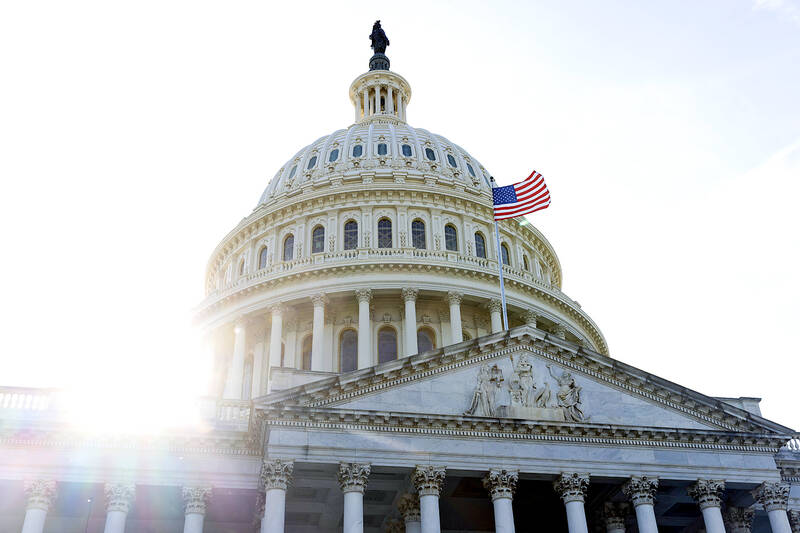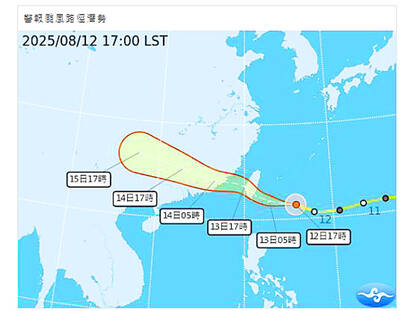The US House of Representatives Select Committee on Strategic Competition Between the US and the Chinese Communist Party (CCP) on Friday introduced a bill that would approve US$120 million to be spent on supporting Taiwan’s international space and tackling coercion by China.
The bipartisan legislation — the Taiwan Allies Fund Act — was proposed ahead of the inauguration of president-elect William Lai (賴清德) of the Democratic Progressive Party (DPP) on May 20.
The committee said in a statement that the bill “strengthens Taiwan’s global network of friends by authorizing [US]$120 million over three years for the State Department and USAID [US Agency for International Development] to provide foreign assistance to Taiwan’s official and unofficial partners subjected to coercion and pressure from the CCP.”

Photo: EPA-EFE
Under the bill, the funding would be part of the Countering the People’s Republic of China Malign Influence Fund.
Countries that qualify would receive US$5 million a year. To qualify they must be able to advance Taiwan’s meaningful participation in international fora and multilateral organizations, diversify supply chains away from China, or build the capacity and resilience of civil society, media and other non-governmental organizations to counter China’s influence and propaganda.
The US encourages countries that have no official ties with Taiwan to deepen their engagement with it, and would help countries that lack the economic or political ability to effectively respond to China’s coercion or pressure, the bill says.
“The Chinese Communist Party has spent decades trying to isolate the free people of Taiwan from the world stage and coerce other nations into severing relations with the thriving democracy,” committee Chairman John Moolenaar said in the statement.
Moolenaar proposed the bill along with Ranking Member Raja Krishnamoorthi, House Foreign Affairs Committee Ranking Member Gregory Meeks and US Congressional Taiwan Caucus cochairs Andy Barr, Ami Bera and Gerald Connolly.
“Our legislation will help Taiwan’s diplomatic allies resist CCP authoritarian pressure campaigns while meeting their development needs. The United States must stand with those who stand with Taiwan,” Moolenaar said.
Since 2013, China has enticed 11 countries to cut relations with Taipei in favor of Beijing, often through bribes and economic inducements, the committee said, adding that after Nauru switched recognition from Taiwan to China in January, Taiwan was left with only 12 diplomatic allies.
China has also weaponized trade and commercial ties to punish countries forging closer unofficial ties with Taiwan, including Lithuania, the committee added.
In the statement, Krishnamoorthi described Taiwan as “one of our closest friends in the world.”
The CCP’s “attempts to intimidate and influence countries who diplomatically recognize Taiwan and economically coerce those who seek to strengthen unofficial relations must be condemned and rejected,” he said.
“It is time for the United States to stand with Taiwan in the face of diplomatic pressure from Beijing that seeks to undermine Taiwan’s rightful participation on the international stage,” Krishnamoorthi said.
The bill is the first legislation co-proposed by Moolenaar after he assumed the chairmanship of the committee last month, when he said his priorities as the chairman included how to expand training programs for Taiwan’s military and eliminate bottlenecks that have left the nation waiting for years to receive the weapons it needs to defend itself.
He has pledged to work tirelessly to deter China’s military aggression against Taiwan and US allies in the Indo-Pacific region.

DEFENSE: The first set of three NASAMS that were previously purchased is expected to be delivered by the end of this year and deployed near the capital, sources said Taiwan plans to procure 28 more sets of M-142 High Mobility Artillery Rocket Systems (HIMARS), as well as nine additional sets of National Advanced Surface-to-Air Missile Systems (NASAMS), military sources said yesterday. Taiwan had previously purchased 29 HIMARS launchers from the US and received the first 11 last year. Once the planned purchases are completed and delivered, Taiwan would have 57 sets of HIMARS. The army has also increased the number of MGM-140 Army Tactical Missile Systems (ATACMS) purchased from 64 to 84, the sources added. Each HIMARS launch pod can carry six Guided Multiple Launch Rocket Systems, capable of

GET TO SAFETY: Authorities were scrambling to evacuate nearly 700 people in Hualien County to prepare for overflow from a natural dam formed by a previous typhoon Typhoon Podul yesterday intensified and accelerated as it neared Taiwan, with the impact expected to be felt overnight, the Central Weather Administration (CWA) said, while the Directorate-General of Personnel Administration announced that schools and government offices in most areas of southern and eastern Taiwan would be closed today. The affected regions are Tainan, Kaohsiung and Chiayi City, and Yunlin, Chiayi, Pingtung, Hualien and Taitung counties, as well as the outlying Penghu County. As of 10pm last night, the storm was about 370km east-southeast of Taitung County, moving west-northwest at 27kph, CWA data showed. With a radius of 120km, Podul is carrying maximum sustained

Tropical Storm Podul strengthened into a typhoon at 8pm yesterday, the Central Weather Administration (CWA) said, with a sea warning to be issued late last night or early this morning. As of 8pm, the typhoon was 1,020km east of Oluanpi (鵝鑾鼻), Taiwan’s southernmost tip, moving west at 23kph. The storm carried maximum sustained winds of 119kph and gusts reaching 155kph, the CWA said. Based on the tropical storm’s trajectory, a land warning could be issued any time from midday today, it added. CWA forecaster Chang Chun-yao (張竣堯) said Podul is a fast-moving storm that is forecast to bring its heaviest rainfall and strongest

TRAJECTORY: The severe tropical storm is predicted to be closest to Taiwan on Wednesday and Thursday, and would influence the nation to varying degrees, a forecaster said The Central Weather Administration (CWA) yesterday said it would likely issue a sea warning for Tropical Storm Podul tomorrow morning and a land warning that evening at the earliest. CWA forecaster Lin Ting-yi (林定宜) said the severe tropical storm is predicted to be closest to Taiwan on Wednesday and Thursday. As of 2pm yesterday, the storm was moving west at 21kph and packing sustained winds of 108kph and gusts of up to 136.8kph, the CWA said. Lin said that the tropical storm was about 1,710km east of Oluanpi (鵝鑾鼻), Taiwan’s southernmost tip, with two possible trajectories over the next one